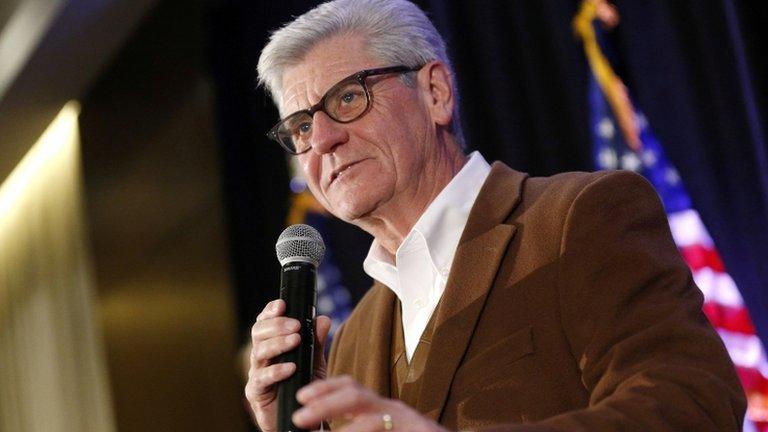What's going on in the fight over US abortion rights?
- Published
The abortion battle explained in three minutes
Louisiana has joined a slew of states across the US in legalising an anti-abortion measure that bans the procedure as soon as six weeks into a pregnancy. What's behind the push - and the backlash - for anti-abortion bills across the US?
In the first months of this year, nearly 30 states introduced some form of an abortion ban in their legislature. Fifteen have specifically been working with so-called "heartbeat bills", that would ban abortion after six weeks of pregnancy.
These bills are part of a wider movement of anti-abortion measures sweeping the US.
Earlier in May, Alabama lawmakers passed a bill to ban abortion outright.
And Missouri's sole remaining abortion clinic remains embroiled in a legal battle to keep its operating license from the state health department. If the provider loses, Missouri will become the only US state without an abortion clinic.
What are these bans - and why now?
"Heartbeat bills", as the term implies, seek to make abortion illegal as soon as what anti-abortion supporters describe as a foetus' heartbeat becomes detectable. The American College of Obstetricians and Gynaecologists says the name is misleading, and that what is being detected is "a portion of the foetal tissue that will become the heart as the embryo develops".
In most cases, this point is at the six-week mark of a pregnancy - before many women even know they are pregnant.
"We have never seen so much action around six-week abortion bans," said Elizabeth Nash, senior state issues manager at the Guttmacher Institute - a pro-choice group that researches sexual and reproductive health.
"But we now have seen a shift in the composition of the US Supreme Court."
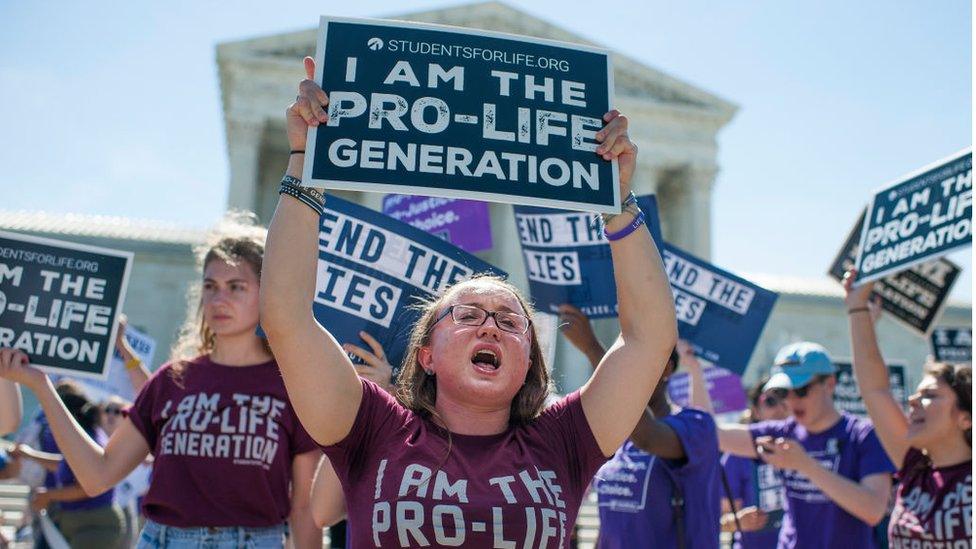
Anti-abortion activists outside the Supreme Court
President Donald Trump has placed two conservative Supreme Court justices and, Ms Nash says, making it seem more amenable to revoking abortion rights.
"Because of this, we are seeing state legislatures looking to ban abortion as a way to kickstart litigation that would come before the [Supreme] court, and the court could then roll back abortion rights."
Other legislators are also responding - in January, New York signed into law a bill safeguarding abortion rights after 24 weeks in certain cases, reigniting discussions about the controversial procedure.
Illinois is the latest Democrat-led state to protect abortion rights, passing a bill in June repealing a 1975 abortion law that required spousal consent, waiting periods, restrictions on facilities and penalties for doctors.
The new measure changes the definition of viability to survival outside the womb without extraordinary medical measures and allows for abortions after the viability point to protect the mother's health.
Vermont also passed legislation affirming abortion rights, and Maine's Democratic Governor Janet Mills signed a bill allowing health care providers who are not physicians to also perform abortions.
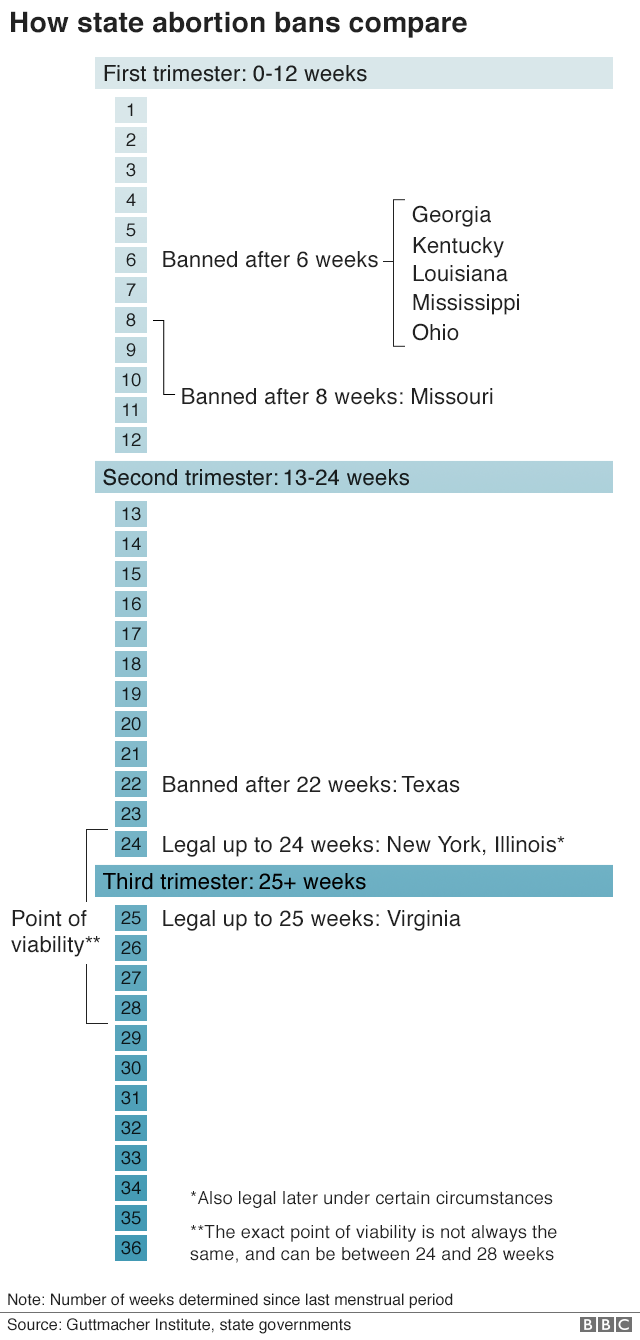

A backlash from business
A growing number of public figures have threatened to divest from the states enacting anti-abortion legislation.
Bob Iger, the CEO of Disney, says Georgia's six-week ban would make it "difficult" to keep filming there.
Georgia has become a popular destination for Hollywood producers who flock to the state for its generous tax breaks for films. It offers a 20% incentive on productions of $500,000 or more and a further 10% if the film includes Georgia's logo in its credits.
Blockbusters like Black Panther and Avengers: Endgame were recently shot in the state.
However, Mr Iger said "many people who work for us will not want to work there" should the law go into effect.
"We will have to heed their wishes," he told Reuters.
Earlier this week, streaming giant Netflix said it would "rethink" its operations in the state if the law goes into effect. Netflix series Stranger Things and Ozark are both shot in Georgia.
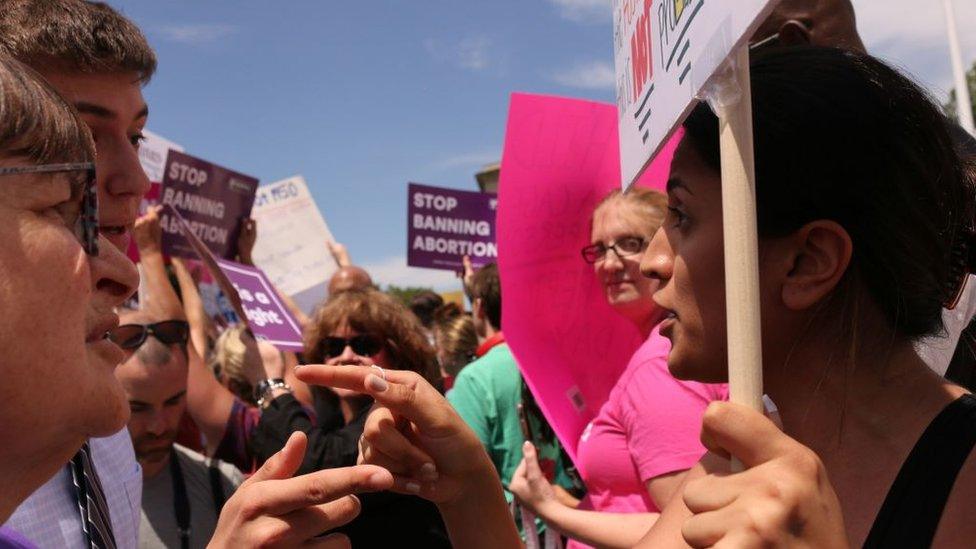
Pro-choice and anti-abortion protestors face off in front of the Supreme Court at protests in May.
But the threats to leave Georgia if the law should take effect are unlikely to be realised in the near future.
Georgia's new law - like others in the anti-abortion movement - are intentionally unconstitutional. Anti-abortion supporters anticipate resulting legal challenges and hope the appeals will reach the US Supreme Court to allow them to re-visit federal laws protecting the procedure.
As of yet, despite the wave of abortion bans, it remains legal in all 50 US states.
Meanwhile, stars including Amy Schumer, Ben Stiller, Christina Applegate, Laverne Cox and Alec Baldwin wrote to the governor, external saying they would "do everything in our power to move our industry to a safer state for women".
Actor Jason Bateman, who stars in the Netflix show Ozark and in HBO's The Outsider, which are both currently filming in Georgia, told The Hollywood Reporter: "I will not work in Georgia, or any other state, that is so disgracefully at odds with women's rights".
So, how did we get here?
The US movement against abortion began in the 1800s, spearheaded by physicians who saw non-medical professionals providing abortion services as both a threat to their industry and harmful to women's health.
By 1900, every state had banned abortions entirely - with exceptions granted only at the discretion of a licensed physician.
The issue arose again in the 1960s, when women began advocating for reproductive rights. Colorado changed its anti-abortion law in 1967, followed soon after by California and New York.
Amid these efforts to return the choice to women, the anti-abortion movement as we currently see it was born, led largely by Catholics and other conservative religious groups. The oldest such group in the US, the National Right to Life, was founded in 1968.
Most funding for the movement still comes from religious conservatives - including wealthy donors like the vocally pro-life DeVos family.
In 1973, the Supreme Court issued the landmark Roe v Wade ruling legalising abortion in all 50 states.
Roe v Wade protects a woman's right to an abortion only until viability - that is, the point at which a foetus is able to live outside the womb, generally at the start of the third trimester, 28 weeks into a pregnancy.
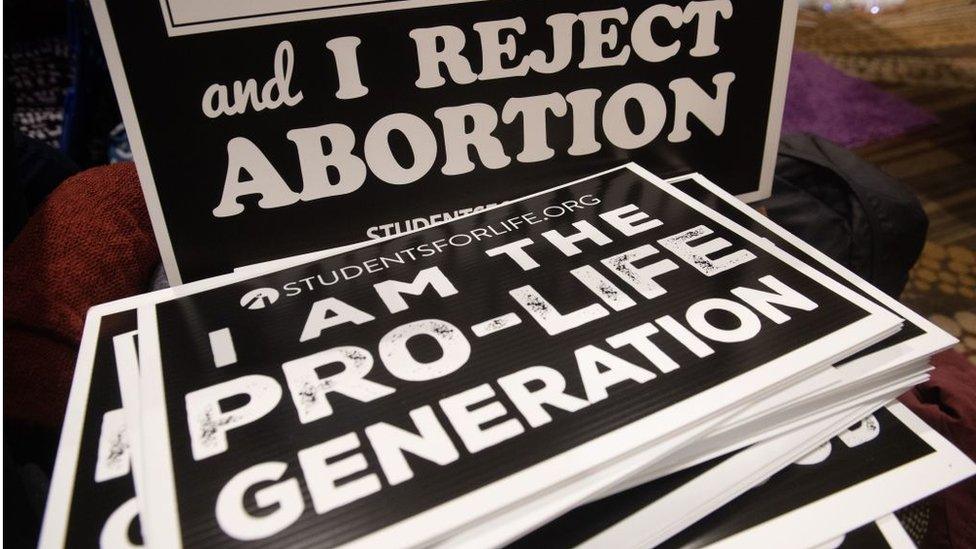
What's happening in Missouri?
In Missouri, the battle over abortion rights is centred on the state's last remaining abortion clinic, which is in jeopardy amidst a standoff with state officials.
The Missouri Department of Health and Senior Services refused to renew the licence for the clinic unless its physicians agree to interviews about what it calls "potential deficient practices".
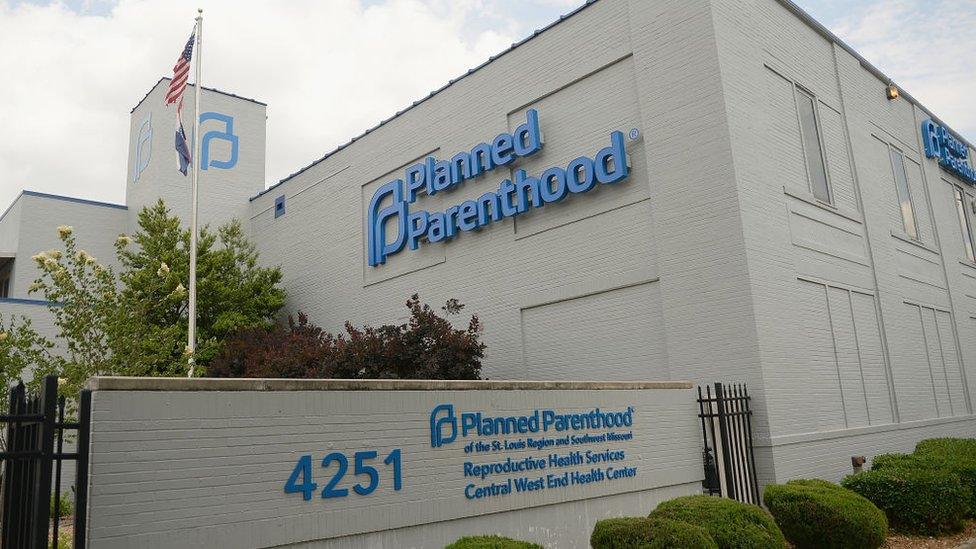
The last remaining abortion clinic in Missouri is under threat of closure
Planned Parenthood, which runs the clinic, has refused, saying it could mean doctors who perform abortions face criminal charges.
It won a court order last month to keep the clinic open on the day it was due to close.
"Today is a victory for women across Missouri, but this fight is far from over," said Dr Leana Wen, president of the reproductive health organisation.
If Planned Parenthood ultimately loses the case, Missouri could become the first state not to have a legal abortion clinic since 1973.
What will the Supreme Court do?
This week, the Supreme Court issued two decisions on an Indiana law restricting abortions, providing a hint at how the top court may respond to other anti-abortion laws.
In an unsigned opinion, the justices upheld a state requirement that all foetal remains - whether the product of a miscarriage or an abortion - be either buried or cremated.
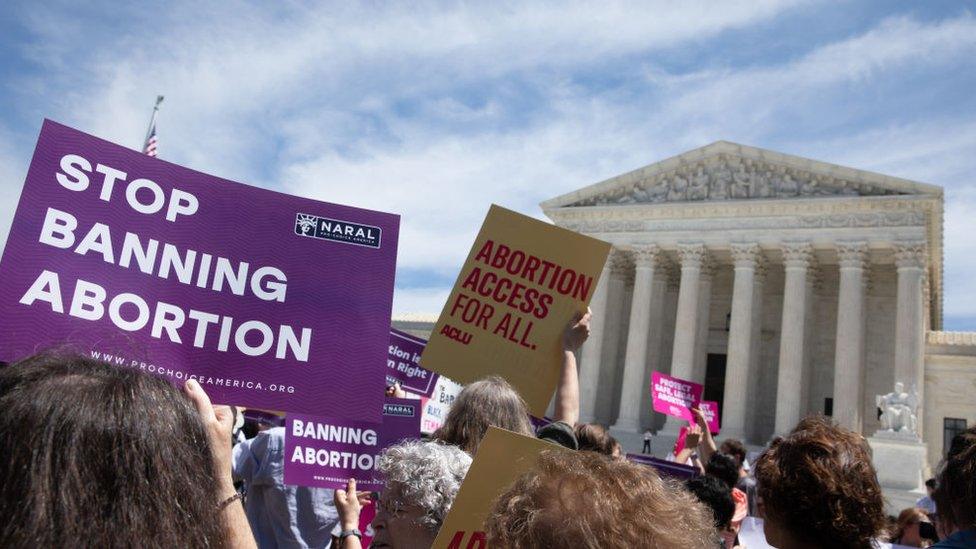
Abortion rights supporters protest outside the Supreme Court
But the justices declined to revive another part of the law that would ban abortions if chosen because of the sex or disability of a foetus.
The court's actions were a mixed bag for those on both sides of the abortion debate.
Anti-abortion activists viewed the provision as a step toward recognising foetal tissue not as medical waste but as human remains deserving dignified treatment.
Abortion rights groups countered that the Supreme Court precedent does not consider a foetus to be human. The purpose of the Indiana law, Planned Parenthood wrote in a statement, is to "shame and stigmatise" women seeking abortions.
By not examining the case in full, the top court effectively punted an opportunity to revisit the 1973 Roe v Wade precedent upholding a woman's right to abortion during the first trimester of pregnancy.
In a concurring opinion, Justice Clarence Thomas, a conservative, said his colleagues on the bench would eventually have to act.
The BBC's Anthony Zurcher says the ruling could be an indication that a majority of the justices on the court are in no hurry to reverse 46 years of precedent.
What does the anti-abortion movement want?
For Karen Swallow Prior, a professor at the evangelical Liberty University who is a proponent of banning abortion outright, these six-week bans are "a good faith effort" to restrict abortion.
"These bills and the pro-life [anti-abortion] movement are not about punishing women for having sex, they are about preserving a human life that already exists," Prof Prior says. She emphasised it was not a religiously motivated viewpoint, but one based on science and human rights.
The Pink House: The last abortion clinic in Mississippi
In addition to these six-week bans, anti-abortion activists have fought for restrictions on abortion methods, rationales (such as sex or race or abnormality) and trigger bans that would end abortion if Roe v Wade is overturned.
According to the Guttmacher Institute, external, 18 states have laws that would restrict abortion in the absence of the federal law, while 10 have laws that would protect abortion in the same scenario.
Voices from the abortion frontline
But some activists are focusing instead on changing infrastructure they view as promoting abortion, rather than seeking to immediately criminalise the procedure.
Destiny Herndon-De La Rosa, founder of New Wave Feminists, says her organisation wants to make abortion "unthinkable".
"We're arguing about autonomy - which is more important, the woman's or the child's? As a pro-life feminist, I believe we have to take into account both."
She is not opposed to the bills, but says her own activism focuses on women's empowerment.
Allow Instagram content?
This article contains content provided by Instagram. We ask for your permission before anything is loaded, as they may be using cookies and other technologies. You may want to read Meta’s Instagram cookie policy, external and privacy policy, external before accepting. To view this content choose ‘accept and continue’.

"We know statistically it's a decision made on financial constraints, lack of access to healthcare, things like that," she says. "Let's get to the real root as to why women feel they have to have an abortion in the first place."
What about the other side?
Reverend Marie Alford-Harkey says the right to have an abortion goes hand in hand with the right to follow one's own values and morals.
Rev Alford-Harkey, who is a Christian pastor and the president and CEO of the Religious Institute, a national multi-faith organisation working for sexual, gender, and reproductive justice, says the notion of reproductive justice, a term created by black women in the 1990s, is behind her pro-choice views.
"It's the human right to maintain personal bodily autonomy, to have children, to not have children, to parent in safe and sustainable communities," Rev Alford-Harkey explains.
"Justice is a very Christian concept, and this particular framework grew out of communities that were not being served."
Rev Alford-Harkey recently began working as an abortion doula, accompanying women into the exam rooms, speaking with them before, after and sometimes even during the procedure.
"I've been asked once or twice if I think God would forgive them and I say, I don't think there's anything for God to forgive. What I think is a sin is that we've taught people that God won't forgive them for doing what's best for their own bodies, their own lives."
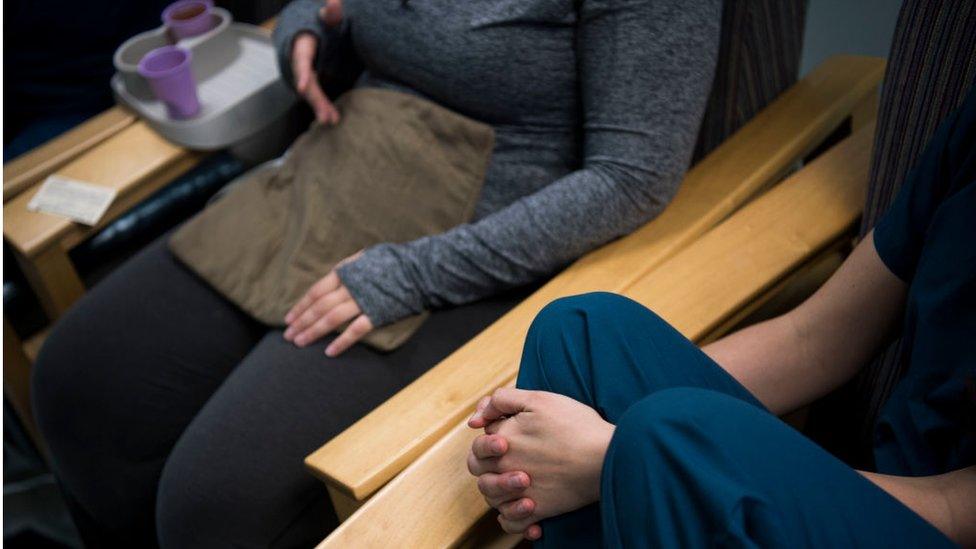
An abortion doula speaks with a patient at a clinic in Virginia
What has Trump said?
President Donald Trump broke his silence last week on the recent restrictions across the US.
Mr Trump, whose position on abortion has shifted dramatically over the years, posted a series of tweets outlining his views, saying he was against abortion except in cases of rape, incest or a "serious health risk" to the mother.
"I am very strongly pro-life, with the three exceptions - rape, incest and protecting the life of the mother - the same position taken by Ronald Reagan", he said.
Allow X content?
This article contains content provided by X. We ask for your permission before anything is loaded, as they may be using cookies and other technologies. You may want to read X’s cookie policy, external and privacy policy, external before accepting. To view this content choose ‘accept and continue’.

The president added that judicial measures, such as his appointment of conservative Supreme Court judges Neil Gorsuch and Brett Kavanaugh, had helped to make abortion laws in various states more restrictive.
Mr Trump's views on abortion have evolved considerably over time.
In 1999, he said: "I'm very pro-choice. I hate the concept of abortion. I hate it. I hate everything it stands for. I cringe when I listen to people debating the subject. But you still - I just believe in choice."
But in March 2016, he clarified that his position was "pro-life with exceptions".
In May, he tweeted that Republicans must unite to "win for life in 2020".
- Published28 January 2019
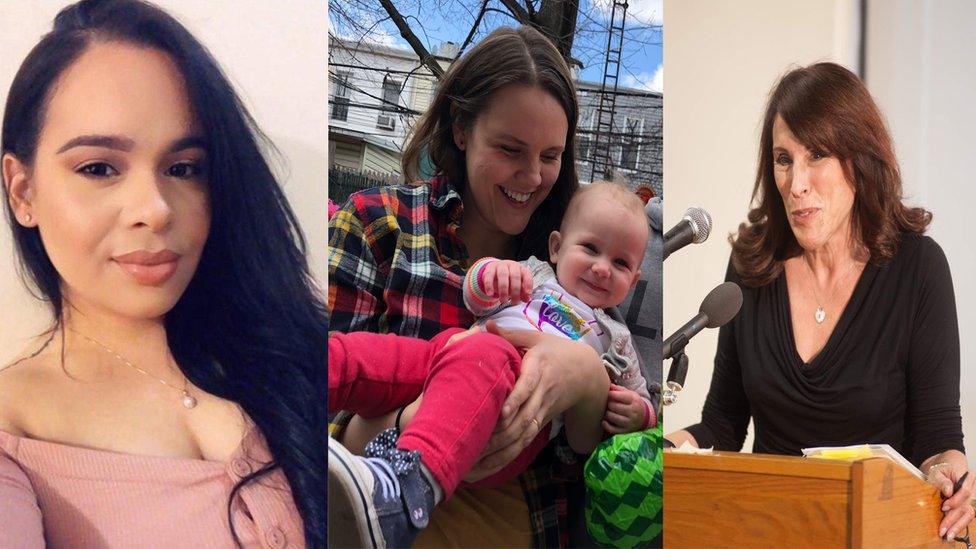
- Published2 May 2018
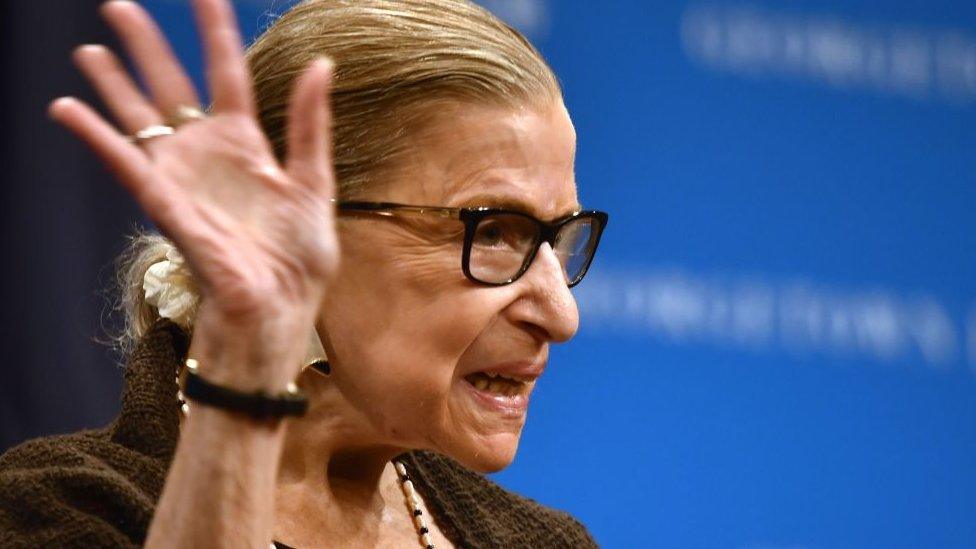
- Published28 June 2018
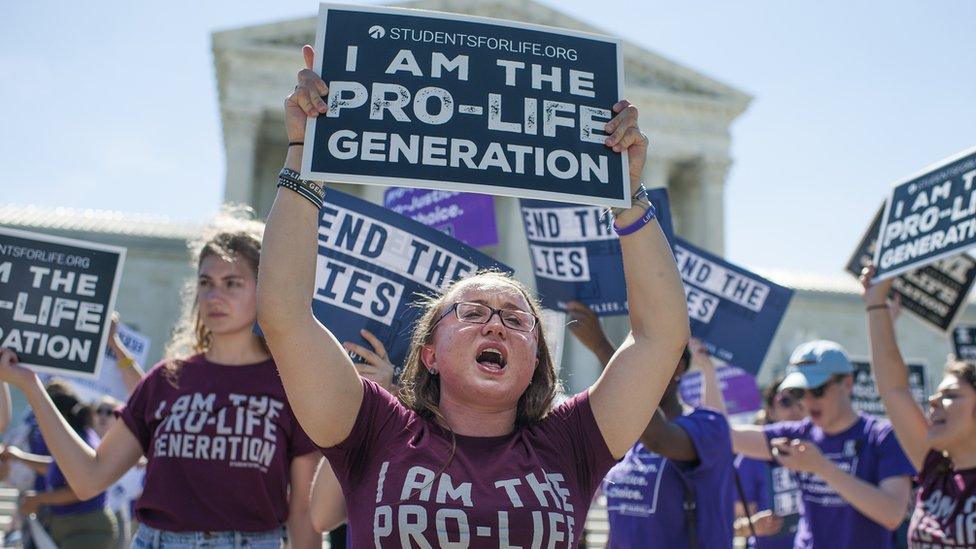
- Published7 March 2019
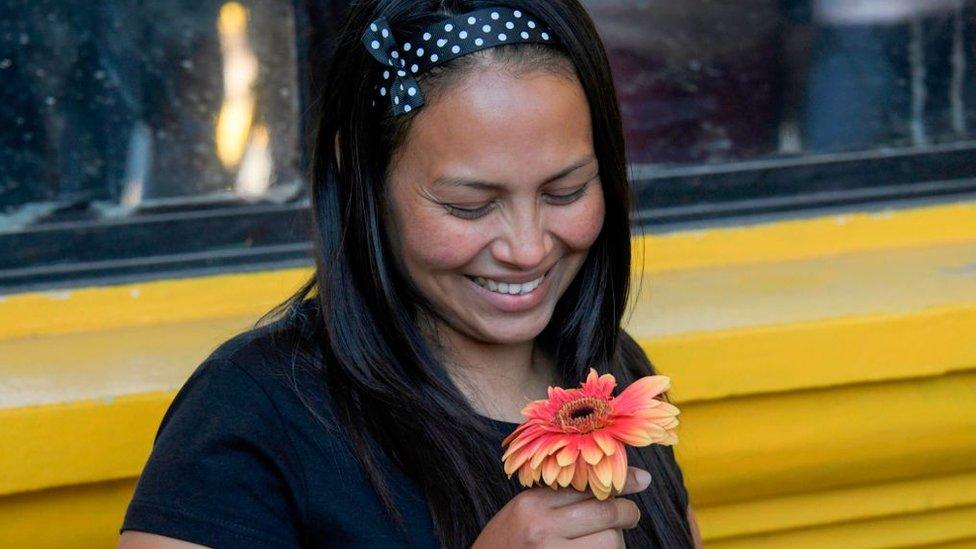
- Published22 March 2019
